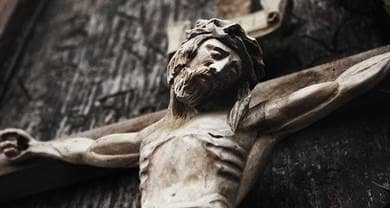- Trending:
- Forgiveness
- |
- Resurrection
- |
- Joy
- |
- Feminism
- |
- Afterlife

RELIGION LIBRARY
Roman Catholicism
Vision for Society
Christianity began as the religion of a persecuted minority within the Roman Empire, but within four centuries it had become the religion of record for the Empire and a determining factor in decisions of state. Empires and kingdoms rose and fell but the Catholic Church maintained its position at the center of western society for well over a thousand years. With the Protestant Reformation of the 16th century and the splintering of western Christianity, the Church's sphere of influence diminished considerably, a process that has continued down to the present day. We can see this most clearly in the figure of the pope, who was once understood to be a territorial ruler and major player in western politics but is not now primarily understood to be a political personage.
The Church's shrinking influence in society has not always been reflected in its theology, which up until the 1960s called for the Church to be established as the state religion in all countries. At Vatican Council II, though, the Church's bishops made a sea change, accepting the diversity of modern communities as a blessing from God and dropping its claims to primacy of place in society. From then on it would recognize the validity, and indeed the beauty, both of other religions and of the social state separate from the Church. We may say that the Catholic vision for society is no longer the vision of a Catholic society. Still, the principle that guided Catholics of bygone eras to desire a Catholic state and modern Catholics to accept diversity remains the same: that society should be organized in accordance with the will of God in such a way as to make the moral life easily accessible and socially accepted.
What drives the Catholic vision for society is a belief in the dignity of the human person; this is the organizing principle around which all of Catholic social teaching is based. Catholics believe that the human was created in the image of God and is worthy of respect at all times, that economic and social differences are acceptable but that differently valuing people is not. The Catholic Church has very strongly criticized most of the major political and economic ideologies of the modern world, including capitalism, socialism, and communism, based on their lack of respect for the worth of the individual: each turns the individual into an economic unit rather than recognizing his or her inherent value.
Looking at political ideologies gives us a top-down approach; looking from the ground up, we see the Catholic belief that society starts with the family. Catholics believe that the marriage of a man and a woman creates a sacred bond that should serve as the starting point for bringing children into the world. They see the family as the most important element in instilling core values in children, giving them to the tools to be responsible, social, and moral adults. Societies, they believe, should advance the cause of the family rather than promote the individual at the cost of his or her natural ties to family. The consequences of this Catholic vision lead to effects in many areas of society; for instance, in the business sphere it means that wages should be sufficient for parents to provide their children with the necessities of life and working hours should allow them time to spend with their families; in societal planning it means that the birth of children should be celebrated as gifts from God rather than artificially limited.
The Catholic vision for society also encompasses the dignity of work, which Catholics consider to be not just a necessity but a spiritual action that leads to human fulfillment. Catholic teaching holds that societies should care for their workers, affording them the respect that is due to every person and the gratitude that is due to those whose labor makes society possible. Care of the earth and the riches God has provided is a growing concern in Catholic social teaching, as is true in many societies and religions. These and other social teachings spring from the Catholic view of society as a work in progress that should always be striving to express the love and justice of God.
This idea of a "work in progress" is true of ecumenical interactions as well, and the Catholic vision for society includes the reintegration of all Christians into one body of fellowship. To this end Catholics participate in a wide variety of ecumenical discussions and theological dialogues, especially through the Church's Pontifical Council for Promoting Christian Unity, created in 1960 as part of the preparation for Vatican Council II.
Study Questions:
1. What historical factors have limited the expansion of the Catholic Church?
2. Is the Catholic vision for society synonymous with the vision of a Catholic society? Explain.
3. Why do the Catholic social teachings focus on social justice rather than religious doctrine?
4. What is the relationship between family life and society?










